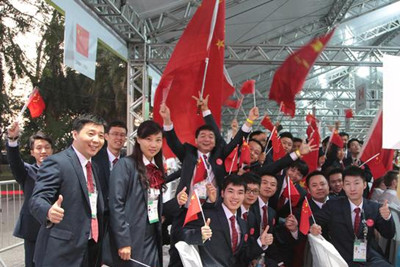This is NEWS Plus Special English.
The 43rd World Skills Competition has closed in Brazil's largest city Sao Paulo, with China scoring four gold medals in manufacturing, welding, hairdressing, and car painting.
In addition to gold medals, competitors from the Chinese delegation also won 6 silver medals, 3 bronze medals and 12 Medals for Excellence.
Chinese officials say the contestants demonstrated their potential; and though the Chinese team has advanced on some categories, no major breakthrough was seen yet. They expect to achieve better results in the future.
The Albert Vidal Award, the highest individual almighty prize, was shared by the competitors of Britain, Brazil and South Korea.
Simon Bartley, president of the Amsterdam-based World-Skills International, said China has gradually progressed in the biennial World Skills Competition, billed as the "Olympics of Skills". He said the Chinese delegation has skilled talents in one fourth of the competing fields, while performing above average in the other fields.
It was the first time that the competition was held in Latin America, with the highest number of participants in its history. A total of almost 1,200 contestants from 59 countries and regions demonstrated their skills during the four-day competition.

This is NEWS Plus Special English.
Beijing was among the worst 10 cities in China for air quality in July, the first time this year the capital has dropped so low.
Only 35 percent of days in the month met the national standard, putting the capital at 65th among the country's 74 major cities.
According to the Ministry of Environmental Protection's monthly air quality report, most of the polluted days registered excessive ozone concentration.
Excessive concentrations of ozone can cause respiratory tract irritation, damage to the body's immune system and affect lung function. Health experts strongly suggest that people stay indoors around noon to avoid the worst of such pollution.
The maximum concentration in eight hours surpassed the national standard by 58 percent, 13 percent higher than the maximum in June.
The ministry report said six cities in Hebei province, which neighbors Beijing, were among the worst 10 in China for severe air pollution in July, of which the city of Xingtai was the most polluted.
Except for the higher ozone concentration, the capital has seen a year-on-year decrease of other major air pollutants. Sulfur dioxide has dropped by 28 percent, and PM2.5, particulate matter with a diameter smaller than 2.5 microns, fell by 32 percent.
Unlike excessive particulate matter in the air, which makes the days smoggy, excessive ozone concentration can occur under blue skies.












